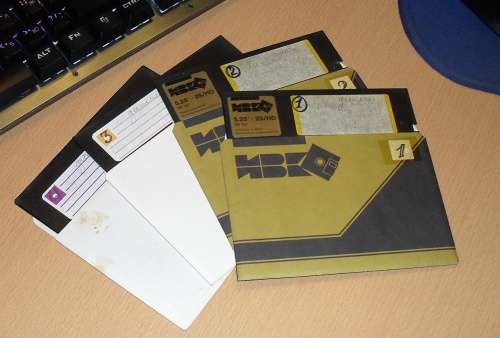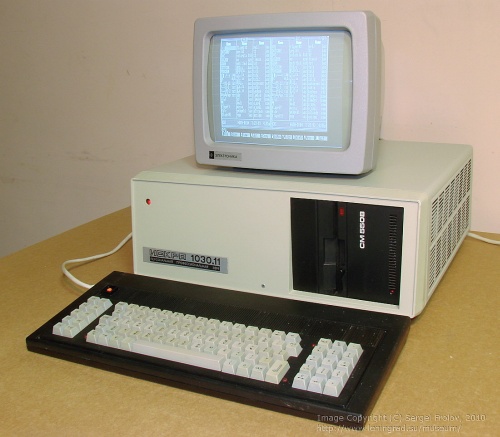Also, stupid me, misplacing my 5-inch drive (I uninstalled it to protect it from being clogged with dust!) to never be found again.
The mystery gnawing at me, I was at the point of shopping for a used 5-inch drive online when my friend took pity on me and lent me one.
After emptying my air can into it to banish herds of dust bunnies and applying WD-40 to the head movement mechanism and a *lengthy, frustrating process of trying to find a combination of a motherboard with a working controller (my 266 MHz fossil has burned out ports, sadly - my old foolishnes of disconnecting a LPT cable without turning the PC off) and an intact cable among many mangled ones, I finally got it working. Yay!
Those 4 read without a hitch (except WinXP requires disabling then re-enabling the drive in the Device manager to actually update the folder contents, why caching it argh - it would gleefully read "files" from a previous disk, in reality just random sectors), the multi-volume RAR archive unpacked fine -- voila, I have my university thesis from my graduation back in 2000
After TWENTY ONE YEARS they read without a hitch! Without losing a single bit!
Hell yeah!

The thesis itself is interesting: most parts are copy-pasted bullshit my supervisor simply gave me to copy while my contribution comes in the form of a Turbo Pascal program I developed that works analyzing noisy real world data from digitizing current in rail switch motors using a simple algorithm to gloss over pits from dirty brushes to restore the exponent they draw in a perfect world and thus measure their worthiness programmatically.
I was scratching my in-between-ears bone trying to figure what my Soviet-based Specialist degree corresponds to, but after some researching through the Net, it seems it's Master's degree in railroad teleautomation -- in a system that existed before adopting the Western standard of separating higher education into Bachelor and Master halves, there were only Specialists (5 year) - basically, bachelor + master with a single thesis defending in the end, with first 2 years dedicated to general sciences like higher math, physics, and so on, while specialization began from the third year with the lazy asses already weeded out. Ooooh, I forgot *so much*. Headdesk.
Never worked even close to my specialty, ended up being a php backend developer.
The vast majority of the programming work in the university was being made using these XT ripoffs in Turbo Pascal
 (full sized: http://www.leningrad.su/museum/show_big.php?n=1435 )
(full sized: http://www.leningrad.su/museum/show_big.php?n=1435 )The machine is cheap crap but they had it in NUMBERS. many, many, MANY labs throughout all the university buildings full of these.
Advice to modern user: if you are so foolish to turn it off before executing park.com first, the hard drive heads could become welded to the disk. You can revive it, though, by opening the hard drive and using a toothpick to force the heads free
I have the sources preserved embedded in the DOC file of the thesis (which unfolded into whopping 40+ megabytes of mostly linked BMP images with schematics) but the disks formatted to 360K with the compiled actual executable and the source data... could not be read, sadly.
Why? Because writing a 360K (40 tracks) disk on a 1.2Mb (80 tracks) drive results in only that drive and any 360K drives being able to read it
The university computers with their 360K drives had no problems with these, as well as the old drive I have misplaced. To never be found again. ARGH.
Also, I had two disks formatted to 1.44Mb capacity using some esoteric tool. Windows XP could read their directory fine but trying to read actual files resulted in immediate failure. Thankfully, they both contained useless trash. I suspect I have to install Windows 98 on that machine again to be read such exotic formats. Win98 was *much* better at working with diskettes.
P.S. I also found my first ever diskette from back in 1988 I was using to store my first QBasic prorgams in the times of yore. "Precision flexible disks Manufactured by Xidex (R)", marked 2S-2D. It was able to hold about 1.1 megabytes in its youth with only the tail of it bad and unreadable sectors, but it have long since deteriorated. Now using Wikipedia I know it's actually a 720K disk. I found it empty, with 460K free (with pencil marking saying its formatted as 810K) So the rest is bad sectors, then? Nope, not touching this one, let's leave it as memento for posterity.
My drawings from back in 1988, made using a keyboard-based editor I wrote in QBasic (dot, line, fill) in EGA 200 lines mode -- those were stored on that disk at some pont as this was the only data storage medium in my possession:
one two three




